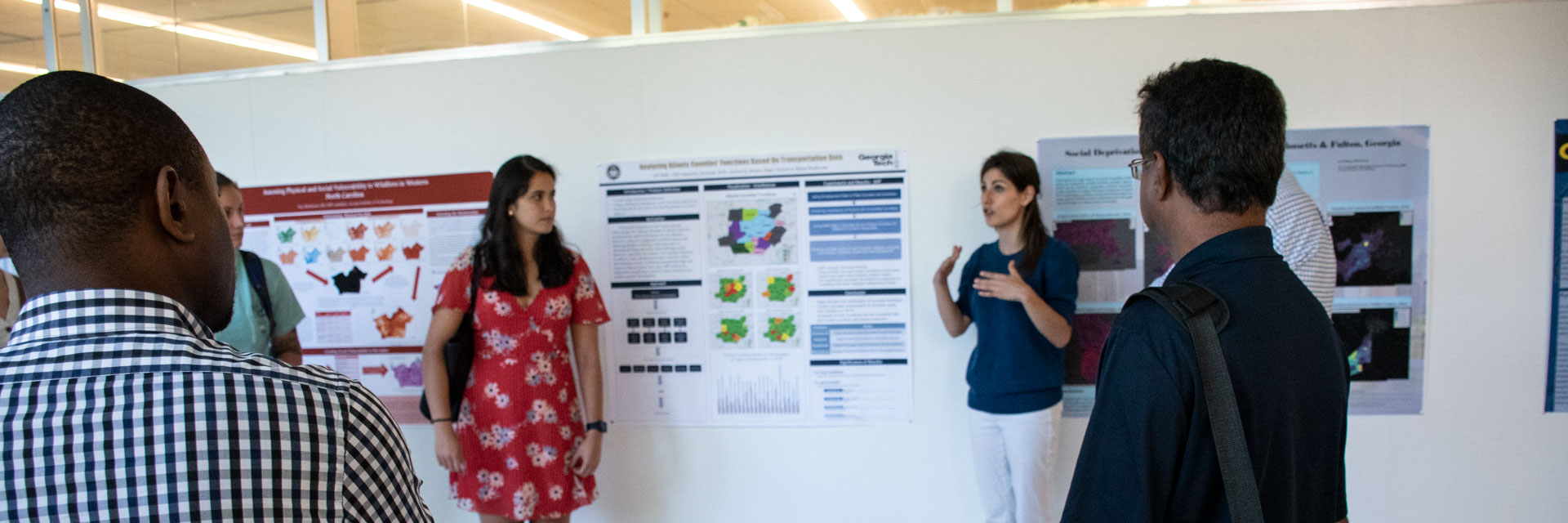
M.S. in Geographic Information Science & Technology
Geographic Information Science (GIS) is an emerging field of study centered on the acquisition, management, analysis, and dissemination of information that is spatially-referenced to locations on, above, and below the surface of the earth.
This field is highly trans-disciplinary with substantial and growing importance in a number of traditional academic disciplines and related professions including:
- City and regional planning
- Architecture
- Civil and environmental engineering
- Earth and atmospheric sciences
- Environmental science
- Public policy
- Sustainability studies
The requirement for Graduate Record Exam (GRE) scores can be waived for all Georgia Tech graduates or undergrads with a GPA at or above 3.0. Please contact Ms. Anna Traykova (anna.traykova@design.gatech.edu) for a waiver.
A basic understanding of GIS technology is required as a prerequisite of the degree program. This may be achieved through one of four options (with number of credit hours):
- CP 4510 Geographic Information Systems (3) or
- CP 6514 Introduction to Geographic Information Systems (3) or
- Equivalent coursework at another institution (as evaluated by the program director)
- One year of equivalent professional experience (as evaluated by the program director)
The required GIS courses (with number of credit hours) are:
- CP 6066 Visualization for Planners (1)
- CP 6025 Advanced Planning Methods (3)
- CP 6521 Advanced GIS (3)
- CP 6531 Introduction to Remote Sensing (3)
- CP 6581 Programming for GIS (3)
- CP 6591 GIS Professionalization (1)
- CP 6592 Capstone Project Research (1)
- CP 6595 GIS Systems Design and Management (3)
- CP 6596 GIS Capstone Project (3)
The required GIS courses (with lecture hours, lab hours, and credit hours) are:
Beyond the basic core of geospatial technology there exists a wide range of specialized GIS data sources and analytical methods. MS-GIST students are required to take a minimum of two specialized GIS courses that focus on the application of GIS technology to specific areas. These courses must be approved by the MS-GIST program director.
They may include (but are not limited to) the following GIS courses (with number of credit hours):
- CP 6570 Socioeconomic GIS (3)
- CP 6541 Environmental GIS (3)
- CP 6542 Transport & GIS (3)
- INFO 530 Geographic Information Systems for Public Health (Crosslisted with the Emory School of Public Health)
Students can select two additional courses as free electives. These will typically include additional specialized GIS courses or courses in GIS-related substantive areas such as city planning, architecture, public policy, computer science and interactive computing, civil engineering, or environmental engineering.
The core of the MS-GIST program is delivered through a body of courses offered by the School of City and Regional Planning. These include courses on quantitative methods, advanced geographic information systems (GIS), remote sensing, transportation GIS, environmental GIS, and socioeconomic GIS.
A full breakdown of the requirements can be found in the MS-GIST Student Manual and on the official GT course catalog.
Applicants complete Georgia Tech’s Graduate Admissions online application, which will prompt them to include all necessary application materials. The priority application deadline for fall semester admission, if an applicant wishes to be considered for merit-based departmental aid, such as fellowships and graduate research assistantships, is January 15th. All other applications can be submitted by the regular application deadline of February 15th or the final (late) application deadline of March 15. Admission decisions are communicated to applicants typically within a month of the application deadline. We encourage applicants to submit their application sooner rather than later - this gives the admissions committee enough time to reach out with questions or an interview invitation if necessary.
Application materials:
- Georgia Tech Application for Graduate Admission
- Answers to the following questions:
- Part 1: Answer only one set of questions below (set 1 or set 2).
Set 1. If you have GIS experience, please answer the following questions:- 1a List courses you have taken that used GIS. What skills did you learn?
- 1b What jobs have you used GIS in and what specific problems did you solve?
- 1c Take a moment to think of a personal experience you had in GIS. In a few sentences, briefly recall the experience. Next, what advice would you give to a GIS-user based on that experience
- Recommended: Please load a .pdf portfolio of previous GIS work that you completed.
- or
- Set 2. If you have NOT had GIS experience, please answer the following questions:
- 2a Why are you interested in Geographic Information Science and Technology?
- 2b What training has prepared you for pursuing a GIS degree?
- Part 2. All applicants:
- What do you want to do after you obtain an MS-GIST degree?
- Part 1: Answer only one set of questions below (set 1 or set 2).
- Resume/Curriculum Vitae
- Three letters of recommendation.
- Official transcripts from all previously attended institutions of higher learning.
- Submitting Graduate Record Examination (GRE) Scores is required for Fall 2024 applicants with the exception of Georgia Tech undergraduates or graduates with a GPA of 3.0 or higher. For a GRE waiver, please contact Ms. Anna Traykova (anna.traykova@design.gatech.edu).
- Proof of English proficiency for applicants whose first language is not English: Test of English as a Foreign Language (TOEFL) with a minimum score of 100 or International English Language Testing System (IELTS) with a minimum score of 7.5. For a complete outline of the English proficiency requirement and ways to get exemptions from testing, please see https://grad.gatech.edu/english-proficiency
Applicants typically demonstrate academic performance that meets or exceeds the following criteria:
- A 3.0-4.0 undergraduate GPA and a 3.5 - 4.0 master’s degree GPA if applicable.
- Graduate Record Examination (GRE) Scores of 150 for Verbal Reasoning, 150 for Quantitative Reasoning, and 4.0 Analytical Writing.
- TOEFL iBT Scores, if applicable, with a minimum of 100 or comparable IELTS score.
Dual Degree applicants must be admitted to the MS-GIST program and the additional degree program separately. Please visit our dual degree webpage for more information, and refer to the other school's websites for information on their admissions process and requirements.
Students are admitted to the MS-GIST program to begin studies in the fall term. Applicants can be considered for spring admissions under unique circumstances such as those experienced by transfer students and dual degree students.
Cost:
The total cost of the program depends on a number of factors: whether a student completes the program full-time or part-time, whether they are eligible for in-state tuition or pay non-resident tuition, whether students are exempt or not from health insurance fees, and what housing, personal and other expenses a student incurs.
Residents of 15 southern US states other than Georgia are potentially eligible for in-state tuition for study toward city planning graduate degrees at Georgia Tech through the Academic Common Market
Current tuition and fee information is available on the Bursar’s website and current year costs estimates that include average housing, meal plan, books, personal, travel and other expenses are posted on the office of Scholarships & Financial Aid website.
International students’ total annual cost for the 2023-2024 academic year is projected to be $53,402 – including tuition, fees, cost of living and miscellaneous related expenses. The estimate for the 2024-2025 academic year is expected to be available for publication in May 2024.
Financial Aid:
The School of City and Regional Planning and Georgia Tech provide a range of financial aid programs to lower the education costs for our students. To learn about the various merit-based and need-based financial aid options, as well as obtain information about relevant internal and external fellowship and educational loan programs, please visit SCaRPs financial aid page.
All MS-GIST applicants who submit applications by the January 15 priority application deadline are automatically considered for merit-based aid, which is given primarily in the form of fellowships and graduate research or teaching assistantships.
Is the MS-GIST program STEM-designated?
The GIS program is STEM-designated.
Are there application fee waivers?
Georgia Tech offers application fee waivers to qualifying applicants. Comprehensive information on whether you qualify for the Institute-sponsored application fee waiver program and how to request one if you do is available here. The School of City and Regional Planning is additionally offering a limited number of department-sponsored application fee waivers to applicants who do not fall in the waiver categories described; If paying the application fee poses an undue financial burden to you and you do not qualify for an Institute-sponsored fee waiver, you may apply to be considered for a SCaRP departmental application fee waiver by completing this form before December 1st.
What are the different application deadlines and how do they affect my chances of admission?
January 15 - priority application deadline; applicants who want to be considered for departmental merit-based aid (graduate research assistantships and fellowships) need to apply by this date.
February 15 - regular application deadline; candidates are encouraged to apply by this deadline; it gives the admissions committee enough time to reach out with questions or an interview invitation if necessary.
March 15 - final (late) application deadline; we understand some applicants cannot meet the regular application deadline for a variety of reasons; we are able to accommodate late applications that are submitted by March 15. Please note we encourage you to submit by the February 15 regular deadline if possible, and if submitting after February 15 to submit as early as possible.
Your chances of admission are not affected by the date of application submission.
Is the MS-GIST program an online program?
The GIS program is a residential, on campus program.
Can the MS-GIST program be completed by part-time students?
We encourage students who can devote their attention to the program full-time to do so. Yet, we realize that this is not possible for everyone and students can enroll part-time. If you plan to do this, please make sure that you discuss the implications this may have on financial aid options with the MS-GIST academic advisor.
Does the School of City and Regional Planning host an on-campus open house for prospective applicants?
Because of feedback from our current and past students, we have transitioned to offering several online information sessions, rather than a prospective student open house. If you would like to visit our campus before you apply, please email us. If you would like a virtual tour of campus, there are several videos of various length available on YouTube. We also offer a virtual tour of campus and an open house for admitted students.
Do we have to reach out to professors before applying to the program?
We are excited to e-meet you all, and at the same time, faculty receive high volumes of emails. You do not have to make contact with professors before you apply to the program. The admissions committee is very happy to see your name for the first time when they look through applications, and there is no downside to not contacting professors before you apply.
Can prospective students speak to current students or alumni?
Yes, of course! You can meet a panel of current students during fall info sessions and you can reach out to our Student Ambassadors – current students who volunteer to answer prospective student questions. Our program directors sometimes invite alumni to join them for the virtual info sessions. And some of our full-time and part-time faculty are SCaRP alumni!
Are computer science classes a part of the MS-GIST curriculum?
GIS is very data-centric and all of our courses integrate some sort of data science aspects in them. If you are looking to take specific Data Science/Analytics courses, you can also take two free electives (from anywhere on campus) as part of the degree. You can take computer science courses as a MS-GIST student through these two free electives. We do not offer courses explicitly about machine learning, although many of our classes have programming components in them. If you want to take a machine learning course, it is possible to do so as one of your free electives.
Are GIS courses open to students outside of the MS-GIST program?
You can take our graduate courses in GIS if you are enrolled in another graduate program at Georgia Tech. The only courses that are 100% reserved for MS-GIST students are our 1-credit courses and the Capstone course in the summer.
Is there a Georgia Tech's frequently asked questions page a.k.a. FAQ?
You can find the Institute grad school application FAQ here.
What are the next steps for admitted MS-GIST students?
Congratulations! Our academic advisor will reach out to you shortly - if she hasn’t done so already - with information about our open house for admitted students, etc. In the meantime, please review this helpful information for accepted students page.
Join virtual office hours to speak with Clio Andris about program content and any other questions you may have regarding the specifics of the MS-GIST program.
Please direct any questions you may have regarding financial aid and application inquiries to scarp@design.gatech.edu.
- Office hours are held on Wednesdays via Zoom from 3 PM - 4 PM EST. Follow this Zoom link to get connected.
- Office hours are from now until March 13, 2023.




